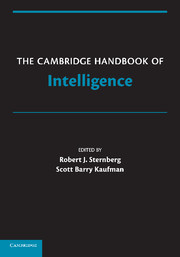Book contents
- The Cambridge Handbook of Intelligence
- The Cambridge Handbook of Intelligence
- Copyright page
- Dedication
- Contents
- Contributors
- Preface
- Part I Intelligence and Its Measurement
- Part II Development of Intelligence
- Part III Intelligence and Group Differences
- Part IV Biology of Intelligence
- Part V Intelligence and Information Processing
- Part VI Kinds of Intelligence
- Part VII Intelligence and Society
- Part VIII Intelligence in Relation to Allied Constructs
- Part IX Moving Forward
- Chapter 42 Where Are We? Where Are We Going? Reflections on the Current and Future State of Research on Intelligence
- Author Index
- Subject Index
Chapter 42 - Where Are We? Where Are We Going? Reflections on the Current and Future State of Research on Intelligence
from Part IX - Moving Forward
Published online by Cambridge University Press: 05 June 2012
- The Cambridge Handbook of Intelligence
- The Cambridge Handbook of Intelligence
- Copyright page
- Dedication
- Contents
- Contributors
- Preface
- Part I Intelligence and Its Measurement
- Part II Development of Intelligence
- Part III Intelligence and Group Differences
- Part IV Biology of Intelligence
- Part V Intelligence and Information Processing
- Part VI Kinds of Intelligence
- Part VII Intelligence and Society
- Part VIII Intelligence in Relation to Allied Constructs
- Part IX Moving Forward
- Chapter 42 Where Are We? Where Are We Going? Reflections on the Current and Future State of Research on Intelligence
- Author Index
- Subject Index
Summary
Keywords
- Type
- Chapter
- Information
- The Cambridge Handbook of Intelligence , pp. 863 - 886Publisher: Cambridge University PressPrint publication year: 2011
- 5
- Cited by

